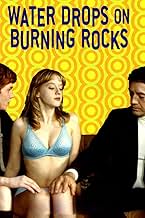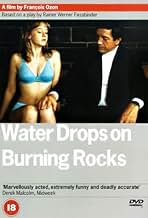Gouttes d'eau sur pierres brûlantes
NOTE IMDb
6,7/10
7,2 k
MA NOTE
En Allemagne dans les années 70, un homme d'affaires de 50 ans tombe amoureux d'un jeune homme de 20 ans.En Allemagne dans les années 70, un homme d'affaires de 50 ans tombe amoureux d'un jeune homme de 20 ans.En Allemagne dans les années 70, un homme d'affaires de 50 ans tombe amoureux d'un jeune homme de 20 ans.
- Réalisation
- Scénario
- Casting principal
- Récompenses
- 2 victoires et 2 nominations au total
Avis à la une
I've never been a big Fassbinder fan but with the coming retrospective I thought it was time to check him out again. So I chose this movie, since it was a Fassbinder script directed by a Frenchman (Ozon) that I admire. It was a delight. Somehow the problems I always had enjoying Fassbinder (the intense cruelty between his characters, the disorienting emotional mood swings, the bleak, dreary German atmosphere) were completely offset by the sense of play and love of color and music that Ozon brings to this script. As in 8 Women, his sense of style and beauty rival Almodovar's and even the grim reality of Fassbinder has a beautiful, chic French gloss. He understands that love and sex in Fassbinder are closely matched with jealousy and destruction. It all clicked for me. And the omnisexuality is so fresh - so unspoiled... That said, it's a devastating critique of what lovers can do to each other. But it's,...well...so pretty...
I really, really enjoyed it.
I really, really enjoyed it.
After watching Water Drops on Burning Rocks, it is hard to tell exactly what flamboyant French filmmaker Francois Ozon wanted to achieve with it. On the one hand, the film is a commentary on relationships and sexuality, but on the other hand, much like Ozon's earlier Sitcom, it's easy to think that the talented young director made the film simply to shock. While I don't doubt that shocking his audience was partly his motivation for making this film, Ozon has still created a film that is more than credible on the substance front as the movie professes that, just like the water drops that land on burning rocks of it's title; relationships and love fizzle out over time. The four parties in the play also represent four different points on the sexuality spectrum; we have an old bi-sexual male, a young confused male, a straight female and a male to female transsexual, so the sexuality commentary is on track as well as the comment on relationships in general. Just like Sitcom, also, Ozon always seems keen to push the taboos of the story into the audience's face; and does a good job, as at times it's easy to feel dirty just watching this movie.
The play that the film works from is from the pen of tortured artist Rainer Werner Fassbinder, and Francois Ozon seems keen to respect this fact throughout as he makes various tributes to Fassbinder's distinct style. Ozon is also keen to work in tributes to the French new wave cinema; most notably with a very strange dance scene, that, in spite of being off-cue with the rest of the movie, works very well thanks to the energy that Ozon gives the scene. It also serves as something of a relief to the disturbing and downbeat themes of the rest of the movie, and it's the only time that the underlying layer of black humour, which lies dormant for the majority of the piece (although it's definitely there), truly comes to the surface. In today's day and age, there are few filmmakers that are still capable of making a film that will leave the audience with something at the end of it; but it's safe to say that Ozon has managed it with this film. When the final credits rolled, I was unsure as to exactly what I had seen, but as time elapsed and I reflected on the movie; it's brilliance comes to light. While the movie isn't quite worthy of the term 'masterpiece'; it is certainly very good, and it represents another huge feather in the already feather-filled cap of Francois Ozon.
The play that the film works from is from the pen of tortured artist Rainer Werner Fassbinder, and Francois Ozon seems keen to respect this fact throughout as he makes various tributes to Fassbinder's distinct style. Ozon is also keen to work in tributes to the French new wave cinema; most notably with a very strange dance scene, that, in spite of being off-cue with the rest of the movie, works very well thanks to the energy that Ozon gives the scene. It also serves as something of a relief to the disturbing and downbeat themes of the rest of the movie, and it's the only time that the underlying layer of black humour, which lies dormant for the majority of the piece (although it's definitely there), truly comes to the surface. In today's day and age, there are few filmmakers that are still capable of making a film that will leave the audience with something at the end of it; but it's safe to say that Ozon has managed it with this film. When the final credits rolled, I was unsure as to exactly what I had seen, but as time elapsed and I reflected on the movie; it's brilliance comes to light. While the movie isn't quite worthy of the term 'masterpiece'; it is certainly very good, and it represents another huge feather in the already feather-filled cap of Francois Ozon.
The film version of Fassbinder's play retains the theatrical structure with 4 acts, 4 actors and 4 great performances. The dialogue wins you over at once and keeps you in rapt attention hanging on every word. Leopold a persuasive self-indulgent bi-sexual restructures the lives of 3 people as he introduces them to new sexual adventures. First there's Franz a good-looking 20 year old who is contemplating marriage with his girlfriend Anna. He becomes confused about love when he has a homosexual dream which Leopold is only too happy to recreate once he has enticed the somewhat inexperienced Franz into his bed. Then there's Anna who is agreeably surprised at the change in Franz's sexual attitude. She too is overwhelmed by Leopold's advances towards her. Thirdly there's Vera - now a woman, once a man - Leopold's ex-lover perhaps more confused and disappointed than any of them. It's an entertaining romp as we watch the hand of experience "create" new lives for each of them. Leopold always in search of novelty knows what each victim is yearning for and he is only too ready to meet their desires....at least until the novelty wears off. I felt the first three acts were absolutely flawless. Act 4 with its black humour was less appealing I thought. The telephone call to his mother was quite unforgettable....."I think I'll go to Heaven because I'm young!"....and spoken with such dead pan sincerity. And the follow-up call to mother was a real gem. Yes...it's the dialogue that fascinates and holds the play together... the casting too is exceptional....and as for the old game of Ludo.... it will be so much more meaningful to me in the future!
Francois Ozon's film version of Fassbinder's play is like another more slightly surreal, very blackly comic version of "The Bitter Tears of Petra Von Kant", played out this time mostly by men. Fifty year old Leo picks up twenty year old Franz and brings him home for the night. Franz stays, becoming his lover, his houseboy but mostly his slave. There are only two other characters in this slight, stage-bound piece; Anna, Franz's vacuous former girlfriend and Vera, Leo's former transsexual lover.
Fundamentally it's about love, of the destructive, unwholesome kind maybe, but love nevertheless. Whatever hold Leo has over Franz, (and Vera), they both love him though it could hardly be said that it is reciprocated. Leo is very much the master and everyone else is his slave. Whether he is capable of love is debatable.
Ozon makes the piece both erotic and humorous but it is never quite as touching as it ought to be. All four players give good performances with Malik Zidi quietly outstanding as the boy.
Fundamentally it's about love, of the destructive, unwholesome kind maybe, but love nevertheless. Whatever hold Leo has over Franz, (and Vera), they both love him though it could hardly be said that it is reciprocated. Leo is very much the master and everyone else is his slave. Whether he is capable of love is debatable.
Ozon makes the piece both erotic and humorous but it is never quite as touching as it ought to be. All four players give good performances with Malik Zidi quietly outstanding as the boy.
And I thought 8 Women was a masterpiece..
Francois Ozon is a filmmaker who is on the high road to immortality. I saw this film late one night when I couldn't sleep and it was the single most enthralling movie-watching experience I've had in that condition. Pourqois?
Three reasons: 1. The gorgeous cinematography. While it was mostly static edited shots, they were Kubrick-accurate (angled impeccably) & the color was so lush I was literally remarking aloud- "Ozon is a master". 2. The gorgeous actors. Only 4 stars in this film, and they are all excellent. Their faces are endlessly fascinating, and I do not have words to describe their beautiful bodies. (J'adore Sagnier Sagnier Sagnier!) 3. The gorgeous story. This film has it all-emotion, sex and death. Everything a successful film should have. But what I say can't come close to the experience. "Water Dropping" should drop your jaw.
Francois Ozon is a filmmaker who is on the high road to immortality. I saw this film late one night when I couldn't sleep and it was the single most enthralling movie-watching experience I've had in that condition. Pourqois?
Three reasons: 1. The gorgeous cinematography. While it was mostly static edited shots, they were Kubrick-accurate (angled impeccably) & the color was so lush I was literally remarking aloud- "Ozon is a master". 2. The gorgeous actors. Only 4 stars in this film, and they are all excellent. Their faces are endlessly fascinating, and I do not have words to describe their beautiful bodies. (J'adore Sagnier Sagnier Sagnier!) 3. The gorgeous story. This film has it all-emotion, sex and death. Everything a successful film should have. But what I say can't come close to the experience. "Water Dropping" should drop your jaw.
Le saviez-vous
- AnecdotesBased on a play written by famous film director Rainer Werner Fassbinder when he was only 19.
- ConnexionsReferenced in Peter von Kant (2022)
- Bandes originalesTräume
Performed by Françoise Hardy
Written by Martin Böttcher (as M. Boetter) / Fred Weyrich (as F. Veyrich)
© Ungernam Productions
Avec l'aimable autorisation de Ungernam Productions
(P) Virgin
Avec l'aimable autorisation de Virgin France
Meilleurs choix
Connectez-vous pour évaluer et suivre la liste de favoris afin de recevoir des recommandations personnalisées
- How long is Water Drops on Burning Rocks?Alimenté par Alexa
Détails
Box-office
- Montant brut aux États-Unis et au Canada
- 86 132 $US
- Week-end de sortie aux États-Unis et au Canada
- 10 617 $US
- 16 juil. 2000
- Durée1 heure 22 minutes
- Couleur
- Mixage
- Rapport de forme
- 1.66 : 1
Contribuer à cette page
Suggérer une modification ou ajouter du contenu manquant

Lacune principale
What is the Spanish language plot outline for Gouttes d'eau sur pierres brûlantes (2000)?
Répondre
























